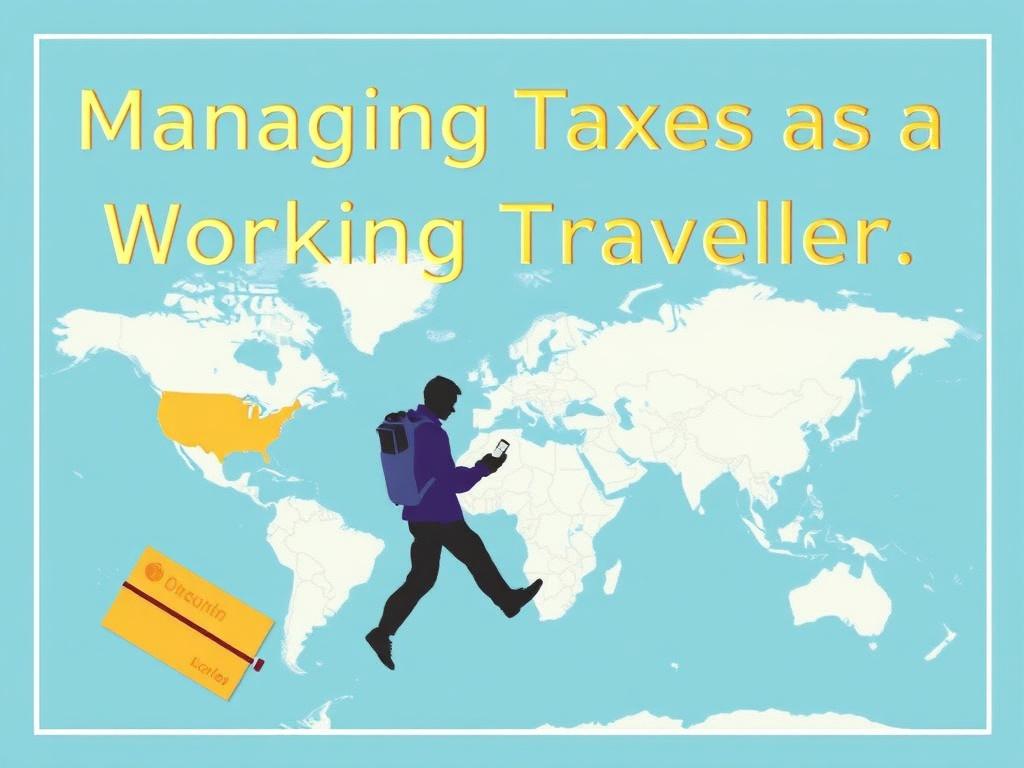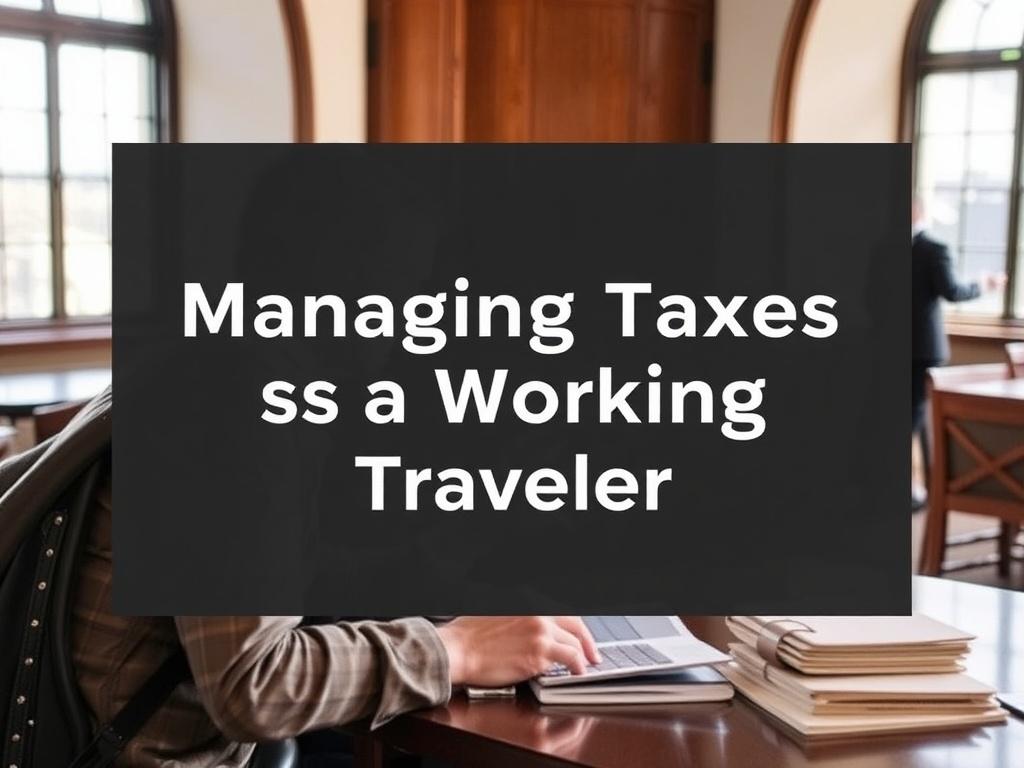In today’s fast-paced world, more and more people are adopting the lifestyle of working travelers—professionals who blend work and exploration, often hopping from country to country. Whether you’re a digital nomad, a freelancer, or someone balancing multiple gigs across borders, managing taxes as a working traveler can be a complex and sometimes confusing challenge. However, understanding your tax obligations and planning carefully can save you from unnecessary headaches and penalties down the road. This article will walk you through everything you need to know about managing taxes as a working traveler, providing tips, strategies, and essential information to keep you compliant and at ease no matter where your journey takes you.
What Does It Mean to Be a Working Traveler?
A working traveler is someone who travels extensively while maintaining a source of income—often remote work, freelance gigs, or running an online business. Unlike traditional employees who work from a fixed location, working travelers face unique tax situations because their income and residency status frequently change. This lifestyle offers fantastic freedom and opportunities to see the world but also demands a thoughtful approach to tax management.
Before diving into the nitty-gritty of tax rules, it’s important to clarify that taxes for working travelers are influenced by several factors, including your country of citizenship, where you earn your income, how long you stay in certain countries, and local tax laws. The key challenge is that tax systems are primarily designed around the idea that people have fixed residences and workplaces, which doesn’t align perfectly with the working traveler lifestyle.
Understanding Tax Residency: The Cornerstone of Working Traveler Taxes
One of the first things to grasp about managing taxes as a working traveler is the concept of tax residency. Tax residency determines which country has the right to tax your worldwide income. Most countries use tests based on the number of days you spend in their territory, your permanent home, or your economic ties to establish residency.
For example, many nations apply the 183-day rule: if you spend 183 days or more in a country during a tax year, you are considered a tax resident there. However, this rule isn’t universal, and some countries consider additional factors like ties of family or business activities. If you don’t meet residency criteria in any one country, you might be considered a non-resident or a tax resident in multiple countries, complicating your tax obligations.
Key Factors Affecting Tax Residency
- Number of days spent in each country
- Location of permanent home
- Place where your main economic interests are
- Where your family resides
- Nationality or citizenship status
Keeping track of your days in each country is crucial. Many working travelers maintain detailed logs of their travel dates to avoid inadvertent residency status changes that trigger unexpected tax liabilities.
Paying Taxes on Global Income: Residents vs. Non-Residents
When you become a tax resident in a country, you’re typically required to pay taxes on your worldwide income, meaning all income earned in any country. In contrast, non-residents are generally taxed only on income sourced within the country where they are present. This distinction is critical for working travelers who earn income in multiple jurisdictions.
For instance, if you’re a tax resident of Country A but work remotely for a client in Country B, Country A might tax your entire income, while Country B might also seek to tax income generated within its borders, depending on local laws. This scenario calls for careful planning to avoid double taxation.
How Double Taxation Happens
Double taxation occurs when two or more countries claim tax on the same income. It is a common risk for working travelers with international earnings. Thankfully, many countries have Double Taxation Agreements (DTAs) that allocate taxing rights and help prevent being taxed twice. These treaties often provide mechanisms like tax credits or exemptions.
Keeping Track of Your Income: Documentation and Reporting

Good record-keeping is the backbone of managing taxes as a working traveler. Documenting every source of income, including dates, amounts, and origin countries, will simplify your tax reporting and prove invaluable if questions arise.
Types of Income to Track
| Income Type | Description |
|---|---|
| Freelance or Consulting Fees | Payments received for projects or services rendered across borders |
| Remote Employment Salary | Standard wages paid by a foreign or domestic employer for remote work |
| Rental Income | Profits from renting properties you own, regardless of your location |
| Dividends and Investments | Returns from stocks, bonds, or other investments held globally |
| Digital Product Sales | Income from selling software, ebooks, courses, or other digital goods online |
Every income source can be taxed differently depending on countries involved, so it’s essential to categorize income carefully and know where it originated.
Using Tax Treaties and Foreign Tax Credits
One useful tool for working travelers is leveraging tax treaties and foreign tax credits. Tax treaties are agreements between countries to avoid double taxation and encourage cross-border economic activity. Understanding which treaties apply to you can significantly cut your tax burden.
Foreign tax credits allow you to reduce your domestic tax liability by the amount of tax you paid abroad, preventing you from paying twice on the same income. However, these credits often have limitations and require accurate documentation of foreign paid taxes.
Steps to Use Foreign Tax Credits Effectively
- Identify which foreign taxes you have paid
- Gather proper documentation, such as tax receipts or certificates
- Check your home country’s rules on foreign tax credits
- File the appropriate forms during your tax return
- Keep thorough records in case of audits
Navigating Self-Employment Taxes as a Working Traveler

Many working travelers are self-employed, which adds another layer of responsibility when managing taxes. Self-employment taxes usually include Social Security and Medicare contributions in countries like the United States, or similar social security obligations in others.
When traveling abroad, understanding where you owe self-employment taxes and whether you qualify for totalization agreements—which coordinate social security coverage between countries—is key to avoiding double contributions or losing entitlements.
Important Considerations for Self-Employed Working Travelers
- Determine where you should pay social security taxes
- Check if your country has a totalization agreement with the countries you reside in
- Plan for paying estimated quarterly taxes when required
- Keep track of allowable business expenses to reduce taxable income
- Consult an accountant familiar with international freelancing
Managing Tax Obligations in Popular Countries for Working Travelers
Different countries have varying tax systems and rules for working travelers, so knowing the specifics of your destination is essential. Below is a simplified overview of tax characteristics in some popular working traveler hubs:
| Country | Tax Residency Rule | Taxation Style | Notable Perks for Working Travelers |
|---|---|---|---|
| United States | 183-day presence or green card holder | Worldwide income | Foreign Earned Income Exclusion (FEIE), foreign tax credits |
| Portugal | 183-day rule or permanent home | Worldwide income | Non-Habitual Resident regime for reduced tax rates |
| Thailand | 180 days in a calendar year | Income earned in or brought into Thailand | Relatively low personal taxes; many digital nomad visas |
| Estonia | 183 days | Worldwide income | e-Residency and digital services for easy company setup |
| Australia | Resides or more than 183 days | Worldwide income | Foreign income exemptions under certain conditions |
This table is a starting point. Working travelers should dive deeper into specific bilateral treaties and local laws of countries they stay in.
Practical Tips for Managing Taxes as a Working Traveler
To successfully navigate your tax responsibilities on the road, consider these practical tips:
- Track your travel days meticulously: Use apps or spreadsheets to monitor time spent in each country.
- Establish a tax home: Some countries use the concept of a ‘tax home’ as your main place of business, which influences residency.
- Hire an international tax advisor: Their expertise can save you money and keep you compliant.
- Maintain clear and organized records: Store income details, invoices, and receipts securely, possibly in cloud storage.
- File timely tax returns: Be aware of filing deadlines to avoid penalties when juggling multiple jurisdictions.
- Use technology for automation: Accounting software helps manage multiple currencies and international invoices.
- Understand visa and permit conditions: Some working visas come with specific tax or social security obligations.
Common Mistakes to Avoid When Managing Taxes as a Working Traveler
Even with good intentions, many working travelers fall prey to common pitfalls. Being aware of these can help you avoid costly mistakes:
- Ignoring tax residency rules: Underestimating the impact of your stay length in a particular country can lead to unexpected tax bills.
- Failing to report foreign income: Non-disclosure can result in fines or audits.
- Overlooking double taxation relief: Many travelers miss out on treaties and foreign tax credits.
- Mixing personal and business finances: This complicates expense deductions and increases audit risk.
- Not seeking professional help when needed: Trying to navigate complex rules without guidance can backfire.
The Role of Technology in Simplifying Tax Management for Working Travelers
Technology is a working traveler’s best friend when it comes to managing taxes efficiently. Cloud-based accounting software, expense tracking apps, and tax calculation tools make it easier to stay organized, maintain compliance, and even prepare filings.
Popular software like QuickBooks, Xero, or specialized international tax tools offer multi-currency support, integration with banking apps, and customizable reporting features designed specifically for freelancers, remote workers, and small business owners.
Moreover, some platforms connect you with tax professionals or provide step-by-step guidance on tax filing based on your country of residence and source of income. Leveraging these tools reduces errors and helps you stay ahead of deadlines.
Understanding Tax Implications of Different Working Traveler Visas
Many countries have introduced visa categories targeting digital nomads and working travelers, such as remote work visas or freelancer permits. While these visas allow you to work legally, they often come with specific tax considerations.
Visa length, permitted activities, and tie-breaker rules may affect your tax residency and required filings. For example, a one-year digital nomad visa may trigger residency after a certain duration, necessitating local tax reporting. Always read visa documentation carefully and check with local or international tax experts.
How to Prepare for Tax Season as a Working Traveler
Tax season can be particularly stressful for working travelers, given their complex circumstances. Preparing early and systematically can alleviate stress and ensure compliance. Here are steps to help:
- Gather all income statements and payment records from multiple sources
- Summarize travel logs and residency periods by country
- Review foreign taxes paid and collect documentation
- Organize deductible expenses related to business activities
- Consult with a tax professional well before filing deadlines
- Use online portals or software for electronic submission when available
- Keep copies of submitted tax returns and correspondence
Looking Ahead: The Future of Tax Rules for Working Travelers
As remote work and international work arrangements grow, governments are continuously updating tax policies to address the evolving working traveler profile. We can expect more countries adopting digital nomad visas, clearer guidelines on tax residency, and international cooperation for transparent taxation.
Emerging technologies like blockchain and AI may also transform tax compliance and reporting, making cross-border tax obligations easier to understand and fulfill. Staying informed and adaptable will be essential for working travelers to manage taxes effectively in the years to come.
Summary Table: Key Tax Concepts for Working Travelers
| Concept | Definition | Relevance |
|---|---|---|
| Tax Residency | The status that determines where you must pay tax on worldwide income | Directly impacts your tax obligations and filing requirements |
| Double Taxation Agreement (DTA) | Treaties between countries to prevent you from paying tax twice on the same income | Reduces tax burden for international earners |
| Foreign Tax Credit | A credit against home country taxes for taxes paid abroad | Helps avoid double taxation |
| Self-Employment Tax | Taxes paid by freelancers and business owners to social security systems | Important for self-employed working travelers |
| Tax Home | Your main place of business or economic activity | Used to determine residency and deductible travel expenses |
Conclusion

Managing taxes as a working traveler may seem daunting at first, but with careful attention to tax residency rules, income documentation, and available tax treaties, it becomes manageable and even empowering. The key is to remain proactive: track your days and income meticulously, seek professional advice when necessary, and embrace technology to stay organized. By understanding the intricacies of international tax systems and preparing ahead, you can enjoy the freedom of working from anywhere in the world without the stress of unexpected tax surprises. Whether you’re planning your next destination or already on the road, this comprehensive guide serves as a solid foundation for navigating your tax responsibilities confidently as a working traveler.









